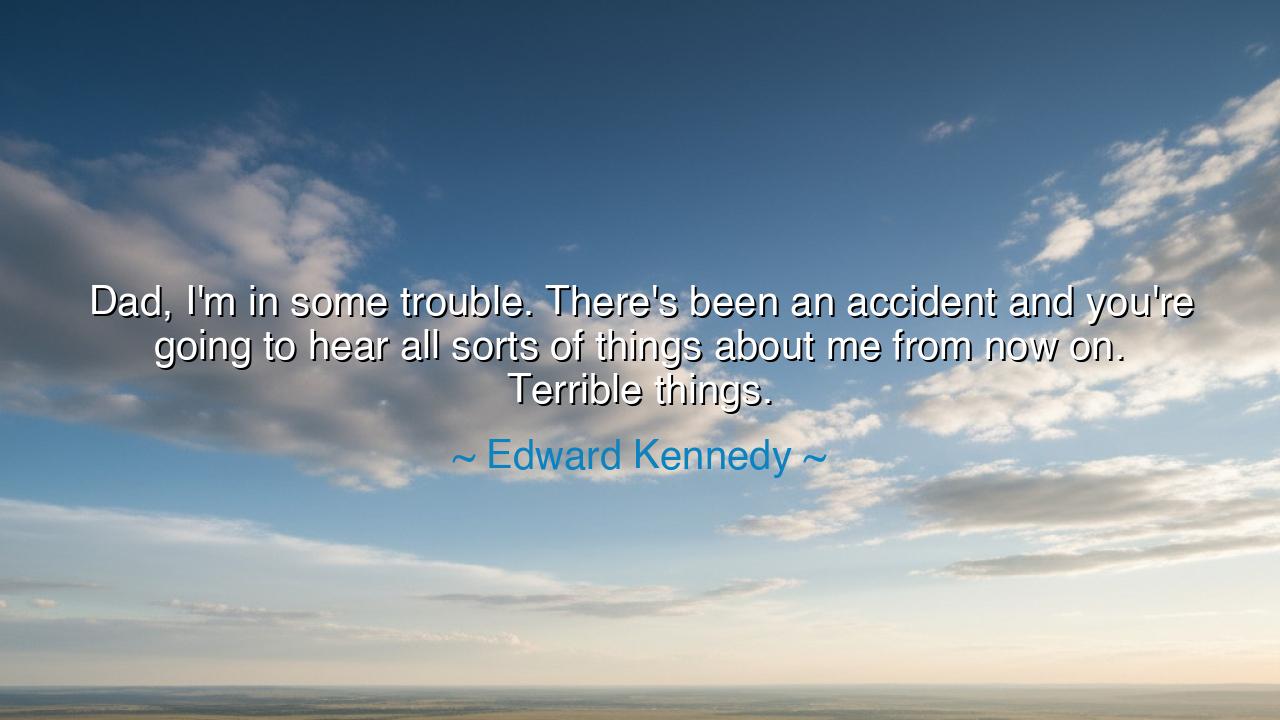
Dad, I'm in some trouble. There's been an accident and you're
Dad, I'm in some trouble. There's been an accident and you're going to hear all sorts of things about me from now on. Terrible things.






The words of Edward Kennedy—“Dad, I’m in some trouble. There’s been an accident and you’re going to hear all sorts of things about me from now on. Terrible things.”—are heavy with remorse, fear, and the crushing weight of consequence. They were spoken not as a crafted speech or political statement, but as a confession from a son to his father in the wake of the Chappaquiddick tragedy of 1969, when a young woman named Mary Jo Kopechne lost her life after Kennedy’s car plunged off a bridge. In those few trembling words, the veil of power was torn, revealing the universal truth that no man—no matter his lineage, fame, or ambition—is immune to human frailty.
At the heart of this quote lies the ancient struggle between duty and failure, between the masks men wear before the world and the truth that lies beneath them. In that moment, Kennedy was not the senator of a great dynasty, but a frightened soul burdened by guilt and dread. The words carry the tone of a confession uttered in the darkness, where greatness is humbled and the spirit is laid bare before the judgment of both man and conscience. “You’re going to hear terrible things about me,” he said—not as an excuse, but as the first ripple of a truth too heavy to bear alone.
There is in this utterance the timeless echo of what the ancients called tragic recognition—the instant when a man sees the cost of his own weakness. Like King David, who cried out in despair after his sin with Bathsheba, Kennedy too glimpsed the chasm between what he was meant to be and what he had become. His words are an acknowledgment that honor once lost cannot be easily reclaimed, and that the fall of a man in public life is not merely political—it is spiritual. To confess to one’s father, to invoke his witness, is to call upon the last bastion of love that endures even when the world condemns.
History has seen this moment repeated across centuries—the powerful brought low, the proud made to kneel before the weight of their own deeds. Marcus Aurelius, the philosopher-emperor, once wrote that the greatest tragedy of man is not what befalls him, but what he allows himself to become. In Kennedy’s plea, we see the same lament. The trappings of legacy, privilege, and expectation crumble, and what remains is a man seeking forgiveness—not from the public, but from the one who gave him life. It is the cry of the prodigal son returning home, knowing that even a father’s love cannot erase the past, but may yet redeem the heart.
The emotional power of this quote lies in its naked humanity. It is a reminder that power does not protect from shame, and that the higher one rises, the deeper one may fall. Kennedy’s life from that night onward was marked by a shadow—one that no title or achievement could fully dispel. Yet in that shadow also lies a lesson for every soul: that repentance begins not in grand gestures, but in the trembling honesty of admission. The act of facing one’s father—symbol of judgment, love, and moral authority—is a return to the origin, where truth can no longer be evaded.
From this tragedy, we are taught that responsibility is the measure of true greatness. A man is not defined by his errors alone, but by how he confronts them. To speak the truth, however painful, is the first act of moral courage. To hide from it is to remain forever enslaved by it. As the ancients said, “The wound that is not exposed to air never heals.” Kennedy’s words, therefore, stand as both confession and warning: concealment deepens corruption; confession begins redemption.
Let this then be the teaching passed down through generations: when the weight of your own deeds crushes your spirit, do not flee from the truth. Seek it, speak it, and face it with the humility of a child who returns home. For every soul will one day utter its own version of these words—“I am in trouble. You will hear terrible things about me.” But only those who confront their failures with honesty can transform guilt into wisdom, and despair into growth. In that humility lies the beginning of greatness, and in truth alone lies peace.






AAdministratorAdministrator
Welcome, honored guests. Please leave a comment, we will respond soon